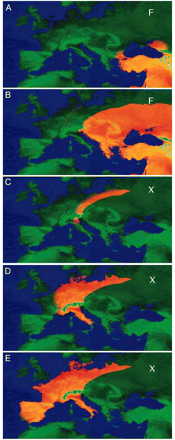May 24, 2007
Surfing on the Wave of Technology
 Cultural hitchhiking on the wave of advance of beneficial technologies -- Ackland et al. 104 (21): 8714 -- Proceedings of the National Academy of Sciences is a nice simulation paper of how the spread of a technology such as farming can create cultural boundaries.
Cultural hitchhiking on the wave of advance of beneficial technologies -- Ackland et al. 104 (21): 8714 -- Proceedings of the National Academy of Sciences is a nice simulation paper of how the spread of a technology such as farming can create cultural boundaries.
The basic model is that people with the technology will do better than people without it, so they will become more numerous and also diffuse. But people without the technology who are in contact with people who have it will tend to adopt it.
The paper looks at agriculture. Starting somewhere in the fertile crescent it spreads outwards as a wave, continuing until it reaches the limits of subsistence. Areas of low fertility such as mountain ranges act as temporary barriers slowing the spread.
The farmers in the remote regions are not descended from the same people as invented farming. At the start the wave is composed of the original farming people spreading outwards, driven by their higher fertility. They convert local hunter-gatherers but the converts get out-competed by the invaders anyway. But at some point the converts become numerous enough to stand on their own and the spread of the original farming people stops. This produces a cultural boundary where the spread of cultural memes hitchiking on the technology stops (and quite possibly a new set takes their place).
They have some nice movies showing the spread of the wave and the eventual "passing of the torch" to converts.
While this was geographically constrained it might be interesting to consider the same thing happening in social networks. Consider the Internet. Originally constrained to a culture of university people and technologists, it co-existed with various "hacker" memes such as tolerance and anti-authoritarianism (cf the Jargon File). Internet began to spread across social networks, giving various benefits. While people might not have become more fertile, the increased connectivity might have had a similar social network effect: they became more connected. The hacker memes were dragged along to some extent, until the Internet finally expanded enough to become independent of hacker culture (you did not need to become a hacker to understand or use it) and the hacker memes stopped spreading. I think cultural hitchiking is a pretty common phenomenon, and it might be fun modelling how it occurs in a purely memetic setting.
Posted by Anders3 at May 24, 2007 12:32 PM